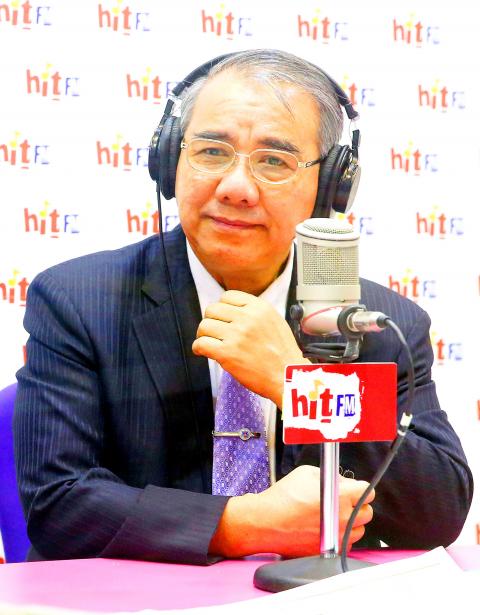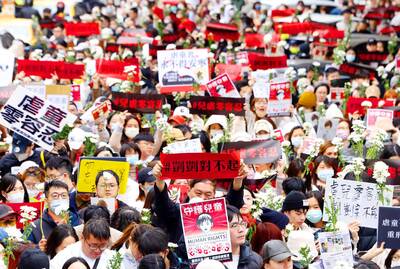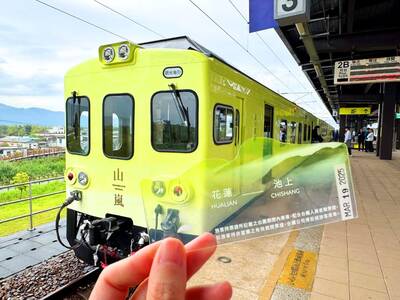Some Chinese Nationalist Party (KMT) members worry about the party becoming another New Party if incumbent Chairwoman Hung Hsiu-chu (洪秀柱) is re-elected next year, KMT caucus convener Sufin Siluko (廖國棟) said yesterday.
Sufin, who on Tuesday called for Hung’s resignation over what he said was a party meeting procedural violation, yesterday said in a radio interview that there are gaps between the party caucus and the party headquarters on various issues, including the direction of the KMT, the party’s assets and the so-called “1992 consensus.”
Tension between the caucus and the headquarters, which has been in the air for some time, manifested in an episode involving Hung railroading through a motion on the party’s election system and dates in a KMT Central Standing Committee meeting last week and the ensuing denunciations from other party heavyweights against the move.

Photo: CNA
Sufin has been one of the most vociferous critics over what he called a “procedural flaw” of the meeting, in which “only five committee members attended the meeting” — which does not meet the quorum — had the final say by bending the rules on what should have been decided by a majority.
The dispute was only partially resolved in this week’s committee meeting as the procedural flaw has yet to be officially recognized, he said.
Radio host Clara Chou (周玉蔻) asked whether opposition to Hung was quelled because she appeared “without the hairpiece she usually wears and without makeup” in a Facebook live video late on Tuesday night, in which she said she wished to have a “heart-to-heart talk” with her supporters and explain her actions in the committee meeting the week before.
“Many said that she was playing weak and trying to appeal to her supporters for sympathy, and committee members felt the pressure,” Chou said.
Sufin denied the allegation against Hung, but said that the meeting on Wednesday failed to properly address the procedural flaw.
Chou said that the decision to increase party representative seats for the party’s Huang Fu-hsing (黃復興) military veterans’ branch, passed on Wednesday, would increase Hung’s chances of re-election, as the military veterans’ branch has always been considered “deep-blue,” and so is Hung.
Sufin said no party member, including KMT Vice Chairman Hau Lung-bing (郝龍斌) and former vice president Wu Den-yih (吳敦義), who both criticized the meeting on Wednesday last week, dares to openly challenge the veterans’ branch.
“Not complying with the established regulations would lead to the collapse of the foundation,” he said, adding that it is not the chairpersonship, but the party’s future he has in mind.
Sufin said some senior party members and businesspeople have come to him expressing concerns that the KMT might create a new party
“Becoming another New Party means moving toward the right end of the political spectrum, but the 100-year-old KMT needs to stand in the center in order to be the ruling party again,” he said.
He said that the KMT has to let the party’s middle generation rise to its top echelon and lead, but added that the KMT’s culture is one in which the “top brass need to be respected while they are still here.”
When asked about the various conflicts between the caucus and the headquarters, Sufin said that the caucus “stands with public opinion.”
“We the caucus want to get out of the quagmire [of ill-gotten party assets] as soon as possible, and uphold that the party assets except those required for personnel expenditure have been dealt with,” he said.
“However, the party headquarters wants to protect the party’s assets and does not consider them ill-gotten,” Sufin said.
“The caucus wishes to maintain the [so-called] 1992 consensus, which says ‘one China, different interpretations,’ while the headquarters wants ‘one China, same interpretation,’” he said.
The so-called “1992 consensus,” a term former Mainland Affairs Council chairman Su Chi (蘇起) in 2006 admitted making up in 2000, refers to a tacit understanding between the KMT and the Chinese government that both sides of the Strait acknowledge there is “one China,” with each side having its own interpretation of what “China” means.

Taiwan yesterday condemned the recent increase in Chinese coast guard-escorted fishing vessels operating illegally in waters around the Pratas Islands (Dongsha Islands, 東沙群島) in the South China Sea. Unusually large groupings of Chinese fishing vessels began to appear around the islands on Feb. 15, when at least six motherships and 29 smaller boats were sighted, the Coast Guard Administration (CGA) said in a news release. While CGA vessels were dispatched to expel the Chinese boats, Chinese coast guard ships trespassed into Taiwan’s restricted waters and unsuccessfully attempted to interfere, the CGA said. Due to the provocation, the CGA initiated an operation to increase

A crowd of over 200 people gathered outside the Taipei District Court as two sisters indicted for abusing a 1-year-old boy to death attended a preliminary hearing in the case yesterday afternoon. The crowd held up signs and chanted slogans calling for aggravated penalties in child abuse cases and asking for no bail and “capital punishment.” They also held white flowers in memory of the boy, nicknamed Kai Kai (剴剴), who was allegedly tortured to death by the sisters in December 2023. The boy died four months after being placed in full-time foster care with the

CHANGING LANDSCAPE: Many of the part-time programs for educators were no longer needed, as many teachers obtain a graduate degree before joining the workforce, experts said Taiwanese universities this year canceled 86 programs, Ministry of Education data showed, with educators attributing the closures to the nation’s low birthrate as well as shifting trends. Fifty-three of the shuttered programs were part-time postgraduate degree programs, about 62 percent of the total, the most in the past five years, the data showed. National Taiwan Normal University (NTNU) discontinued the most part-time master’s programs, at 16: chemistry, life science, earth science, physics, fine arts, music, special education, health promotion and health education, educational psychology and counseling, education, design, Chinese as a second language, library and information sciences, mechatronics engineering, history, physical education

The Shanlan Express (山嵐號), or “Mountain Mist Express,” is scheduled to launch on April 19 as part of the centennial celebration of the inauguration of the Taitung Line. The tourism express train was renovated from the Taiwan Railway Corp’s EMU500 commuter trains. It has four carriages and a seating capacity of 60 passengers. Lion Travel is arranging railway tours for the express service. Several news outlets were invited to experience the pilot tour on the new express train service, which is to operate between Hualien Railway Station and Chihshang (池上) Railway Station in Taitung County. It would also be the first tourism service